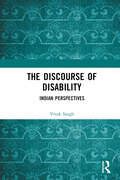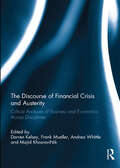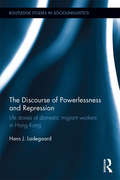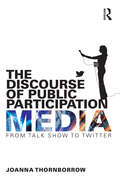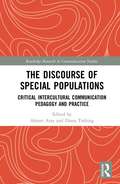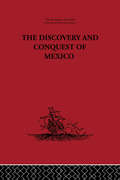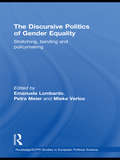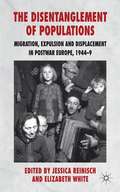- Table View
- List View
The Discourse of Disability: Indian Perspectives
by Vivek SinghThis book explores the concept of disability through a social, political, cultural, religious, and economics lens. It challenges the categorization of ‘physically-disabled’ produced by way of legal, medical, political, cultural, and literary narratives that comprise an exclusionary discourse.The volume discusses themes like disability and identity politics; disability and the western epistemology; disability in India; disability and the Indian English fiction and Hindi cinema to question the embodied hegemony of ‘norms’ and their effects in the construction and history of societies. It analyses select literary and cinematic texts like Trying to Grow, Fireproof, and Animal’s People; and movies, Black and Lafangey Parindey to critically examine the representation of disabled people as freak, monstrous and animal. The book also makes policy recommendations for inclusive education and work norms for disabled people.This book will be beneficial for scholars and researchers of disability studies, cultural studies, film studies, and English literature.
The Discourse of Exile in Early Modern English Literature
by J. Seth LeeThis volume examines the literary works of English exiles seeking to navigate what Edward Said calls "the perilous territory of not-belonging." The study opens by asking, "How did exile impact the way an early modern writer defined and constructed their personal and national identity?" In seeking an answer, the project traces the development of the "mind of exile," a textual phenomenon that manifests as an exiled figure whose departure and return restructures a stable, traditional center of socio-political power; a narrative where a character, an author, a reader, or some combination of the three experiences a type of cognitive displacement resulting in an epiphany that helps define a sense of self or national identity; and narratives that write and rewrite historical narratives to reimagine boundaries of national identity either towards or away from exiled groups or individuals. The study includes case studies from a variety of authors and groups – Geoffrey Chaucer, Edmund Spenser, the Wycliffites, the Marian Exiles, and their Elizabethan Catholic counterparts – to provide a clearer understanding of exile as an important part of the development of a modern English national identity. Reading exilic texts through this lens offers a fresh approach to early modern narratives of marginalization while examining and clarifying the importance of the individual experience of exile filtered through literary consciousness.
The Discourse of Financial Crisis and Austerity: Critical analyses of business and economics across disciplines
by Darren Kelsey, Frank Mueller, Andrea Whittle and Majid KhosraviNikThis book demonstrates the importance of understanding how political rhetoric, financial reporting and media coverage of austerity in transnational contexts is significant to the communicative, social and economic environments in which we live. It considers how aspects of moral storytelling, language, representation and ideology operate through societies in financial crisis and through governments that impose austerity programmes on public spending. Whilst many of the debates covered here are concerned with UK economic policy and British social contexts, the contributions also consider examples from other countries that reflect similar concerns on the ideological operations of austerity and financial discourse. The multiple discursive contexts of austerity demonstrate the breadth of social concerns and conflicts that have developed in societies and institutions following the global economic crisis of 2008. Through its interdisciplinary focus on this topic, this book provides an important contribution across multiple subject areas, with shared interests in critical and analytical approaches to discourse, power and language in social contexts reflecting the healthy collaborative scope of critical discourse studies as a field of research. This book was originally published as a special issue of Critical Discourse Studies.
The Discourse of Police Interviews
by Marianne Mason Frances RockForensic linguistics, or the study of language and the law, is a growing field of scholarly and public interest with an established research presence. The Discourse of Police Interviews aims to further the discussion by analyzing how police interviews are constructed and used to investigate and prosecute crimes. The first book to focus exclusively on the discourses of police interviewing, The Discourse of Police Interviews examines leading debates, approaches, and topics in contemporary police interview research. Among other topics, the book explores the sociolegal, psychological, and discursive framework of popular police interview techniques employed in the United States and the United Kingdom, such as PEACE and Reid, and the discursive practices of institutional representatives like police officers and interpreters that can influence the construction and quality of linguistic evidence. Together, the contributions situate the police interview as part of a complex, and multistage, criminal justice process. The book will be of interest to both scholars and practitioners in a variety of fields, such as linguistic anthropology, interpreting studies, criminology, law, and sociology.
The Discourse of Police Interviews
by Marianne Mason Frances RockForensic linguistics, or the study of language and the law, is a growing field of scholarly and public interest with an established research presence. The Discourse of Police Interviews aims to further the discussion by analyzing how police interviews are constructed and used to investigate and prosecute crimes. The first book to focus exclusively on the discourses of police interviewing, The Discourse of Police Interviews examines leading debates, approaches, and topics in contemporary police interview research. Among other topics, the book explores the sociolegal, psychological, and discursive framework of popular police interview techniques employed in the United States and the United Kingdom, such as PEACE and Reid, and the discursive practices of institutional representatives like police officers and interpreters that can influence the construction and quality of linguistic evidence. Together, the contributions situate the police interview as part of a complex, and multistage, criminal justice process. The book will be of interest to both scholars and practitioners in a variety of fields, such as linguistic anthropology, interpreting studies, criminology, law, and sociology.
The Discourse of Police Interviews
by Marianne Mason Frances RockForensic linguistics, or the study of language and the law, is a growing field of scholarly and public interest with an established research presence. The Discourse of Police Interviews aims to further the discussion by analyzing how police interviews are constructed and used to investigate and prosecute crimes. The first book to focus exclusively on the discourses of police interviewing, The Discourse of Police Interviews examines leading debates, approaches, and topics in contemporary police interview research. Among other topics, the book explores the sociolegal, psychological, and discursive framework of popular police interview techniques employed in the United States and the United Kingdom, such as PEACE and Reid, and the discursive practices of institutional representatives like police officers and interpreters that can influence the construction and quality of linguistic evidence. Together, the contributions situate the police interview as part of a complex, and multistage, criminal justice process. The book will be of interest to both scholars and practitioners in a variety of fields, such as linguistic anthropology, interpreting studies, criminology, law, and sociology.
The Discourse of Powerlessness and Repression: Life stories of domestic migrant workers in Hong Kong (Routledge Studies in Sociolinguistics)
by Hans J. LadegaardDrawing on a large corpus of narratives recorded at a church shelter for abused domestic helpers in Hong Kong, this monograph explores how the women discursively construct themselves in sharing sessions with other helpers. They see themselves as ‘helpers’ who have come to Hong Kong to help their families, to help the people in the city, and to serve God. A wide variety of competing identities are constructed in the narratives: submissive helper, sacrificial mother, daughter and wife, and powerless traumatised victim, but also resourceful indignant migrant women who, through sharing and peer support, become empowered to fight against abusive employers. This book provides a detailed discourse analysis of the women’s narratives, but it also explores larger issues such as global migration, exploitation, language and power, abuse and the psychology of evil, intergroup communication, and peer support and empowerment.
The Discourse of Public Participation Media: From talk show to Twitter
by Joanna ThornborrowThe Discourse of Public Participation Media takes a fresh look at what ‘ordinary’ people are doing on air – what they say, and how and where they get to say it. Using techniques of discourse analysis to explore the construction of participant identities in a range of different public participation genres, Joanna Thornborrow argues that the role of the ‘ordinary’ person in these media environments is frequently anything but. Tracing the development of discourses of public participation media, the book focusses particularly on the 1990s onwards when broadcasting was expanding rapidly: the rise of the TV talk show, increasing formats for public participation in broadcast debate and discussion, and the explosion of reality TV in the first decade of the 21st century. During this period, traditional broadcasting has also had to move with the times and incorporate mobile and web-based communication technologies as new platforms for public access and participation - text and email as well as the telephone - and an audience that moves out of the studio and into the online spaces of chat rooms, comment forums and the ‘twitterverse’. This original study examines the shifting discourses of public engagement and participation resulting from these new forms of communication, making it an ideal companion for students of communication, media and cultural studies, media discourse, broadcast talk and social interaction.
The Discourse of Repatriation in Britain, 1845-2016: A Political and Social History (Routledge Studies in Modern British History)
by Daniel RenshawExamining responses to migration and settlement in Britain from the Irish Famine up to Brexit, The Discourse of Repatriation looks at how concepts of removal evolved in this period, and the varied protagonists who have articulated these ideas in different contexts. Analysing the relationship between discourse and action, Renshaw explores how ideas and language originating on the peripheries of debate on migration and belonging can permeate the mainstream and transform both discussion and policy. The book sheds light both on how the migrant ‘other’ has been viewed in Britain, historically and contemporaneously, and more broadly how the relationship between state, press, and populace has developed from the early Victorian period onwards. It identifies key junctures where the concept of the removal of ‘othered’ groups has crossed over from the rhetorical to the actual, and considers why this was the case. Based on extensive original archival research, the book reassesses modern British history through the lens of the most polarised attitudes to immigration and demographic change. This book will be of use to readers with an interest in migration, diaspora, the development of populism and political extremes, and more broadly the history of modern Britain.
The Discourse of Special Populations: Critical Intercultural Communication Pedagogy and Practice (Routledge Research in Communication Studies)
by Ahmet Atay Diana TrebingThe term "special population" occupies a particular purpose and has a particular role in the discourse of higher education. This book uses the term as an umbrella term for any student who tends to be underrepresented on college campuses and has a very specific set of unique needs: among others, individuals with physical and learning disabilities, international students, ethnic minorities, LGBTQ students, single parents, and first generation and other non-traditional student groups. Sometimes these "special" student groups are visible to educators; however, quite often they are hidden in plain sight, which makes it difficult for educators to work effectively and meaningfully with these student groups. This book uses the framework of critical intercultural communication pedagogy to generate a discussion about pedagogical issues surrounding students who are categorized as "special populations", focusing on culturally sensitive pedagogical methods to educate all students.
The Discourse of YouTube: Multimodal Text in a Global Context (Routledge Studies in Multimodality)
by Phil BensonThe Discourse of YouTube explores the cutting edge of contemporary multimodal discourse through an in-depth analysis of structures, processes and content in YouTube discourse. YouTube is often seen as no more than a place to watch videos, but this book argues that YouTube and YouTube pages can also be read and analysed as complex, multi-authored, multimodal texts, emerging dynamically from processes of textually-mediated social interaction. The objective of the book is to show how multimodal discourse analysis tools can help us to understand the structures and processes involved in the production of YouTube texts. Philip Benson develops a framework for the analysis of multimodality in the structure of YouTube pages and of the multimodal interactions from which their content emerges. A second, and equally important, objective is to show how the globalization of YouTube is central to much of its discourse. The book identifies translingual practice as a key element in the global discourse of YouTube and discusses its roles in the negotiation of identities and intercultural learning in videos and comments. Focusing on YouTube as a key example of new digital media, The Discourse of YouTube makes a substantial contribution to conversations about new ways of producing multimodal text in a digital world.
The Discourses And Politics Of Migration In Europe
by Umut Korkut Gregg Bucken-Knapp Aidan Mcgarry Jonas Hinnfors Helen DrakeThis book is a comprehensive study of migration politics in ten European countries, tracing how language, discourse, and political parties matter to migration policymaking.
The Discovery and Conquest of Mexico 1517-1521: Containing A True And Full Account Of The Discovery And Conquest Of Mexico And New Spain
by Bernal Diaz CastilloFirst published in 1928.'Something more than an historical document of the first importance...his narrative is so readable that one's interest and admiration are equally divided between the stupendous events he records and the charming revelations of his own character.' Saturday Review.Four eye-witnesses of the discovery and conquest of Mexico by the Spaniards have left written records, but of these the present volume and the letters of Cortés (Volume 14) are by far the most important.
The Discovery of the Asylum: Social Order and Disorder in the New Republic (New Lines In Criminology Ser.)
by David J. RothmanThis is a masterful effort to recognize and place the prison and asylums in their social contexts. Rothman shows that the complexity of their history can be unraveled and usefully interpreted. By identifying the salient influences that converged in the tumultuous 1820s and 1830s that led to a particular ideology in the development of prisons and asylums, Rothman provides a compelling argument that is historically informed and socially instructive. He weaves a comprehensive story that sets forth and portrays a series of interrelated events, influences, and circumstances that are shown to be connected to the development of prisons and asylums. Rothman demonstrates that meaningful historical interpretation must be based upon not one but a series of historical events and circumstances, their connections and ultimate consequences. Thus, the history of prisons and asylums in the youthful United States is revealed to be complex but not so complex that it cannot be disentangled, described, understood, and applied.This reissue of a classic study addresses a core concern of social historians and criminal justice professionals: Why in the early nineteenth century did a single generation of Americans resort for the first time to institutional care for its convicts, mentally ill, juvenile delinquents, orphans, and adult poor? Rothman's compelling analysis links this phenomenon to a desperate effort by democratic society to instill a new social order as it perceived the loosening of family, church, and community bonds. As debate persists on the wisdom and effectiveness of these inherited solutions, The Discovery of the Asylum offers a fascinating reflection on our past as well as a source of inspiration for a new century of students and professionals in criminal justice, corrections, social history, and law enforcement.
The Discovery of the Asylum: Social Order and Disorder in the New Republic (Revised Edition)
by David J. RothmanThis is a masterful effort to recognize and place the prison and asylums in their social contexts. Rothman shows that the complexity of their history can be unraveled and usefully interpreted. By identifying the salient influences that converged in the tumultuous 1820s and 1830s that led to a particular ideology in the development of prisons and asylums, Rothman provides a compelling argument that is historically informed and socially instructive. He weaves a comprehensive story that sets forth and portrays a series of interrelated events, influences, and circumstances that are shown to be connected to the development of prisons and asylums. Rothman demonstrates that meaningful historical interpretation must be based upon not one but a series of historical events and circumstances, their connections and ultimate consequences. Thus, the history of prisons and asylums in the youthful United States is revealed to be complex but not so complex that it cannot be disentangled, described, understood, and applied. This reissue of a classic study addresses a core concern of social historians and criminal justice professionals: Why in the early nineteenth century did a single generation of Americans resort for the first time to institutional care for its convicts, mentally ill, juvenile delinquents, orphans, and adult poor? Rothman's compelling analysis links this phenomenon to a desperate effort by democratic society to instill a new social order as it perceived the loosening of family, church, and community bonds. As debate persists on the wisdom and effectiveness of these inherited solutions, The Discovery of the Asylum offers a fascinating reflection on our past as well as a source of inspiration for a new century of students and professionals in criminal justice, corrections, social history, and law enforcement. David J. Rothman is Bernard Schoenberg Professor of Social Medicine and Director of the Center for the Study of Society and Medicine at the Columbia College of Physicians and Surgeons, and Professor of History at Columbia University. He has written and edited a number of books exploring the history and impact of caretaker and custodial institutions, including hospitals, mental hospitals, prisons, and almshouses. Among his works are Strangers at the Bedside; Politics and Power; Social History and Social Policy; and Doing Good.
The Discursive Construction of Blame: The Language of Public Inquiries
by James MurphyThis book examines the language of public inquiries to reveal how blame is assigned, avoided, negotiated and discussed in this quasi-legal setting. In doing so, the author adds a much-needed linguistic perspective to the study of blame – previously the reserve of moral philosophers, sociologists and psychologists – at a time when public inquiries are being convened with increasing frequency. While the stated purpose of a public inquiry is rarely to apportion blame, this work reveals how blame is nevertheless woven into the fabric of the activity and how it is constructed by the language of the participants. Its chapters systematically analyse the establishment of inquiries, their questioning patterns, how blame can be avoided by witnesses, how blame is assigned or not by an inquiry’s panel and how such blame may result in public apologies. The author concludes with an engaging discussion on the value of public inquiries in civic life and suggestions for changes to the processes of public inquiries. This book will appeal to readers with a general interest in public and political language; in addition to scholars across the disciplines of communication, media studies, politics, sociology, social policy, philosophy, psychology, linguistics, rhetoric, public relations and public affairs.
The Discursive Interview: Method and Methodological Foundation
by Carsten G. UllrichThis book deals with the Discursive Interview, a qualitative interview method originally developed for the recording and reconstruction of social patterns of interpretation. The central methodological assumptions are explained and all methodological steps of this comprehensive research method are outlined (in particular sampling, guideline development, interviewing, reconstructive analysis, typing, quality assurance). Particular emphasis is placed on the role of questions and questioning techniques, because these are of central importance for uncovering patterns of interpretation. The content Interpretive patterns and interpretive pattern analysis ● Theoretical and methodological basic assumptions of the discursive interview ● Data collection with discursive interviews ● On the evaluation of discursive interviews ● Quality assurance with the discursive interview The author Dr. Carsten G. Ullrich holds the professorship for methods of qualitative social research at the Faculty of Education at the University of Duisburg-Essen.
The Discursive Politics of Gender Equality: Stretching, Bending and Policy-Making (Routledge/ECPR Studies in European Political Science)
by Emanuela Lombardo Mieke Verloo Petra MeierThis book explores the discursive constructions of gender equality and the implications of these understandings in a broad range of policy fields. Using gender equality as a prime example, a number of internationally renowned scholars offer a new vocabulary to identify and study processes of the reduction, amplification, shifting or freezing of meaning. The main aim of the book is to understand the dynamics and to reflect on the consequences of such discursive politics in recent policy making on gender equality. It explores both the potential opportunities that are opened up for the promotion of equality through discursive politics, and the limitations they impose. Distinctive features of the volume include: chapters covering a range of case studies in Europe, the USA, and the Asia region, tackling contemporary political debates on equality new insights of relevance to public policy practices such as gender mainstreaming, with theorizing on intersecting inequalities The Discursive Politics of Gender Equality will be of interest to students and scholars, of political science, public policy, comparative politics, gender and women studies.
The Discursive Power of Memes in Digital Culture: Ideology, Semiotics, and Intertextuality (Routledge Studies in New Media and Cyberculture)
by Bradley E. WigginsShared, posted, tweeted, commented upon, and discussed online as well as off-line, internet memes represent a new genre of online communication, and an understanding of their production, dissemination, and implications in the real world enables an improved ability to navigate digital culture. This book explores cases of cultural, economic, and political critique levied by the purposeful production and consumption of internet memes. Often images, animated GIFs, or videos are remixed in such a way to incorporate intertextual references, quite frequently to popular culture, alongside a joke or critique of some aspect of the human experience. Ideology, semiotics, and intertextuality coalesce in the book’s argument that internet memes represent a new form of meaning-making, and the rapidity by which they are produced and spread underscores their importance.
The Diseasing of America's Children: Exposing the ADHD Fiasco and Empowering Parents to Take Back Control
by John Rosemond Bose RavenelHow parents, teachers, and even professionals are being deceived by the "ADHD Establishment" regarding ADHD and other childhood behavior disorders and the drugs used to treat them. The issue of diagnosing children with behavioral diseases that do not conform to a scientific definition of disease, and then medicating them is a scandal ready to erupt. In The Diseasing of America's Children, popular family psychologist, speaker and best-selling author John Rosemond joins with pediatrician Dr. Bose Ravenel to uncover the fiction and fallacy behind attention-deficit/hyperactivity disorder (ADHD), oppositional defiant disorder (ODD), early-onset biopolar disorder (EOBD), and the drugs prescribed to treat them. Rosemond and Ravenel will: reveal the pseudo-science behind these diagnoses; explain how parents, teachers, and even professionals are deceived; expose the short- and long-term dangers behavioral drugs pose to children; discuss how America's schools are unwittingly feeding the diagnostic beast; reveal the simple, common sense truth behind these behavior problems and give parents a practical program for curing these problems without drugs or dependence on professionals.
The Disenfranchisement of Ex-Felons
by Hull Elizabeth A.In the 2004 presidential election, 4,686,539 Americans—a population greater than the city of Los Angeles—were barred from the polls. In a country that has extended suffrage to virtually every other class of citizen, ex-felons are the sole segment of our population deemed unworthy to exercise what the Supreme Court has called "the right preservative of all other rights," the right to vote. The Disenfranchisement of Ex-Felons provides a comprehensive overview of the history, nature, and far-reaching sociological and political consequences of denying ex-felons the right to vote. Readers learn state practices in Florida and Ohio during the 2000 and 2004 presidential elections; arguments that have been used in court houses, legislatures, and the press to justify such practices; and attempts to reverse legislation through state and federal governments. In a timely appendix to the 2004 election, Elizabeth Hull makes her case that the battle for civil rights will not be won unless ex-felons, who have fulfilled their obligations to society, are restored the same rights afforded all other American citizens.
The Disengaged Teen: Helping Kids Learn Better, Feel Better, and Live Better
by Jenny Anderson Rebecca Winthrop&“Our education systems are shortchanging far too many teenagers. This book is brimming with insights on how to change that. It&’s an engaging, evidence-based, and practical read about how to develop a generation of lifelong learners.&”—Adam Grant, #1 New York Times bestselling author of Hidden Potential and Think Again, and host of the podcast Re:ThinkingA powerful toolkit for parents of both checked-out and stressed-out teens that shows exactly what to do (and stop doing) to support their academic and emotional flourishing. Adolescents are hardwired to explore and grow, and learning is mainly how they do this. But a shocking majority of teens are disengaged from school, simultaneously bored and overwhelmed. This is feeding an alarming teen mental health crisis. As kids get older and more independent, parents often feel powerless to help. But fear not, there are evidence-backed strategies to guide them from disengagement to drive, in and out of school. For the past five years, award-winning journalist Jenny Anderson and the Brookings Institution&’s global education expert Rebecca Winthrop have been investigating why so many children lose their love of learning in adolescence. Now, weaving extensive original research with real-world stories of kids who transformed their relationships with learning, they identify four modes of learning that students use to navigate through the shifting academic demands and social dynamics of middle and high school, shaping the internal narratives about their skills, potential, and identity: • Resister. When kids resist, they struggle silently with profound feelings of inadequacy or invisibility, which they communicate by ignoring homework, playing sick, skipping class, or acting out. • Passenger. When kids coast along, consistently doing the bare minimum and complaining that classes are pointless. They need help connecting school to their skills, interests, or learning needs. • Achiever. When kids show up, do the work, and get consistently high grades, their self-worth can become tied to high performance. Their disengagement is invisible, fueling a fear of failure and putting them at risk for mental health challenges. • Explorer. When kids are driven by internal curiosity rather than just external expectations, they investigate the questions they care about and persist to achieve their goals. Understanding your child&’s learning modes is vital for nurturing their ability to become Explorers. Anderson and Winthrop outline simple yet counterintuitive parenting strategies for connecting with your child, tailoring your listening and communication styles to their needs, igniting their curiosity, and building self-awareness and emotional regulation.
The Disentanglement of Populations
by Elizabeth White Jessica ReinischAn examination of population movements, both forced and voluntary, within the broader context of Europe in the aftermath of the Second World War, in both Western and Eastern Europe. The authors bring to life problems of war and post-war chaos, and assess lasting social, political and demographic consequences.
The Disfigured Face in American Literature, Film, and Television (Routledge Advances in Sociology)
by Gudrun M. Grabher Cornelia KleckerThe face, being prominent and visible, is the foremost marker of a person’s identity as well as their major tool of communication. Facial disfigurements, congenital or acquired, not only erase these significant capacities, but since ancient times, they have been conjured up as outrageous and terrifying, often connoting evil or criminality in their associations – a dark secret being suggested "behind the mask," the disfigurement indicating punishment for sin. Complemented by an original poem by Kenneth Sherman and a plastic surgeon’s perspective on facial disfigurement, this book investigates the exploitation of these and further stereotypical tropes by literary authors, filmmakers, and showrunners, considering also the ways in which film, television, and the publishing industry have more recently tried to overcome negative codifications of facial disfigurement, in the search for an authentic self behind the veil of facial disfigurement. An exploration of fictional representations of the disfigured face, this book will appeal to scholars of sociology, cultural and media studies, American studies and literary studies with interests in representations of disfigurement and the Other.
The Dish: The Lives and Labor Behind One Plate of Food
by Andrew Friedman“A thorough, lively work of on-the-ground reportage. ... Friedman shares a remarkable story." —Wall Street JournalAcclaimed “chef writer” Andrew Friedman introduces readers to all the people and processes that come together in a single restaurant dish, creating an entertaining, vivid snapshot of the contemporary restaurant community, modern farming industry, and food-supply chain. On a typical evening, in a contemporary American restaurant, a table orders their dinner from a server. It’s an exchange that happens dozens, or hundreds, of times a night—the core transaction that keeps the place churning. In this book, acclaimed chef writer Andrew Friedman slows down time to focus on a single dish at Chicago’s Wherewithall restaurant, following its production and provenances via real-time kitchen and in-the-field reportage, from the moment the order is placed to when the finished dish is delivered to the table.As various components of this one dish are prepared by the kitchen team, Friedman introduces readers to the players responsible for producing it, from the chefs who conceived the dish and manage the kitchen, to the line cooks and sous chefs who carry out the actual cooking, and the dishwashers who keep pace with the dining room.Readers will also meet the producers, farmers, and ranchers, who supply the restaurant, as Friedman visits each stop in the supply chain and profiles the key characters whose expertise and effort play essential roles in making the dish possible—they will walk rows of crops that line Midwestern farms, feel the chill of the cooler where beef dry-ages, harvest grapes at a Michigan winery, ride along with a delivery-truck driver, and hear the immigration sagas prevalent amongst often unseen and unheralded farm and restaurant workers.The Dish is a rollicking ride inside every aspect of a restaurant dish. Both a fascinating window onto our food systems, and a celebration of the unsung heroes of restaurants and the collaborative nature of professional kitchen work, The Dish will ensure that readers never look at any restaurant meal the same way again. "Masterful. ... Friedman excels at bringing the dining room to boisterous life with vivid, telling details. ... This will sate gastronomes and casual foodies alike." — Publishers Weekly (starred review)
